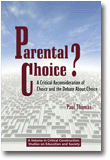
Parental Choice?
A Critical Reconsideration of Choice and the Debate about Choice
By:
P. L. Thomas, Furman University
A volume in the series: Critical Constructions: Studies on Education and Society. Editor(s): Brad J. Porfilio, California State University, Stanislaus. Marc Pruyn, Monash University. Derek R. Ford, DePauw University.
Published 2010
Education has rarely been absent from local and national public discourse. Throughout the history of modern education spanning more than a century, we have as a culture lamented the failures of public schooling, often making such claims based on assumptions instead of any nuanced consideration of the many influences on teaching and learning in any child's life—notably the socioeconomic status of a student's family.
School reform, then, has also been a frequent topic in political discourse and public debate. Since the mid-twentieth century, a rising call for market forces to replace government-run schooling has pushed to the front of those debates. Since A Nation at Risk in the early 1980s and the implementation of No Child Left Behind at the turn of the twenty-first century, a subtle shift has occurred in the traditional support of public education—fueled by the misconception that private schools out perform public schools along with a naive faith in competition and the promise of the free market. Political and ideological claims that all parents deserve school choice has proven to be a compelling slogan.
This book unmasks calls for parental and school choice with a postformal and critical view of both the traditional bureaucratic public school system and the current patterns found the body of research on all aspects of school choice and private schooling. The examination of the status quo and market-based calls for school reform will serve well all stakeholders in public education as they seek to evaluate the quality of schools today and form positions on how best to reform schools for the empowerment of free people in a democratic society.
CONTENTS
Preface. Introduction. 1. “Pay No Attention to the Man Behind the Curtain”: A Critical Guide to Education, Research, and the Politics of It All. 2. Education as Political Football: What We Know (and Don’t Know) About School Choice and Accountability. 3. Seeing Education Again for the First Time, Or School Isn’t What It Used to Be...Or Is It? 4. The Child in Society, the Child at Home, the Child at School. 5. Caught Between our Children and Testing, Testing, Testing. 6. Parental Choice?—A Postformal Response. Conclusion. References. About the Author.
-
Paperback978-1-61735-089-4
Web price: $45.04 (Reg. 52.99)
-
Hardcover978-1-61735-090-0
Web price: $80.74 (Reg. 94.99)
- eBook9781617350917

-
 DIY Punk as Education
From Mis‐education to Educative Healing
DIY Punk as Education
From Mis‐education to Educative Healing
-
 Imagining Education
Beyond the Logic Of Global Neoliberal Capitalism
Imagining Education
Beyond the Logic Of Global Neoliberal Capitalism
-
 Multiculturalism, Dialectical Thought, and Social Justice Pedagogy
A Study from the Borderlands
Multiculturalism, Dialectical Thought, and Social Justice Pedagogy
A Study from the Borderlands
-
 Read Aloud Handbook for Native American Children
Read Aloud Handbook for Native American Children
-
 Rethinking Social Studies
Critical Pedagogy in Pursuit of Dangerous Citizenship
Rethinking Social Studies
Critical Pedagogy in Pursuit of Dangerous Citizenship
-
 The 2017 Hampton Reader
Selected Essays from a Working-class Think Tank
The 2017 Hampton Reader
Selected Essays from a Working-class Think Tank
-
 The Luso-Anarchist Reader
The Origins of Anarchism in Portugal and Brazil
The Luso-Anarchist Reader
The Origins of Anarchism in Portugal and Brazil

